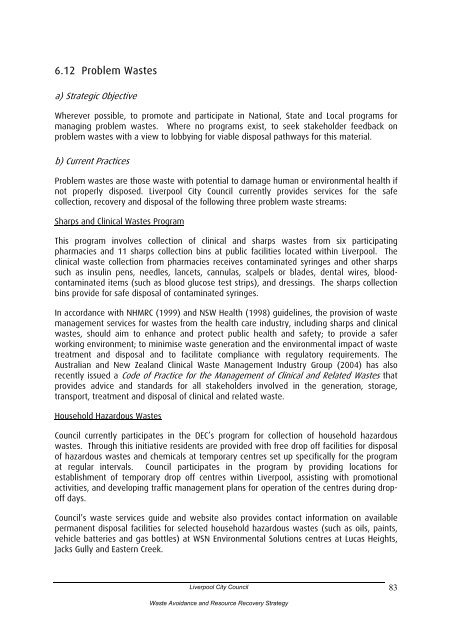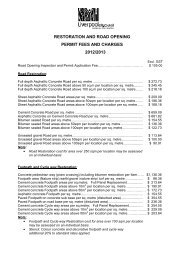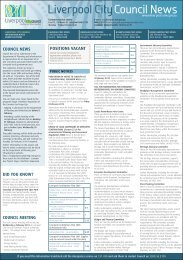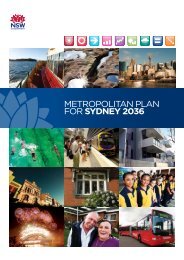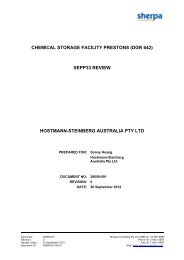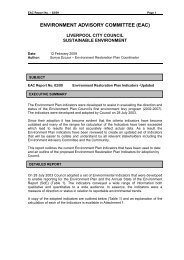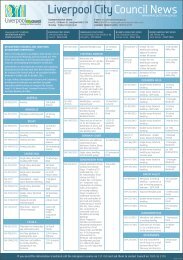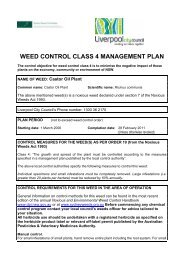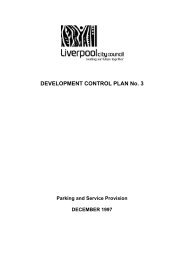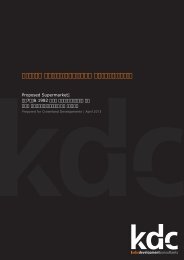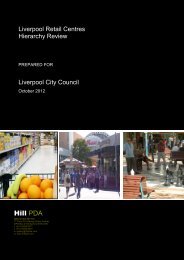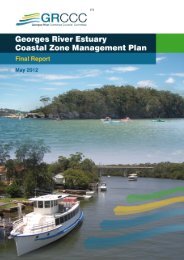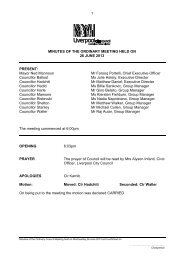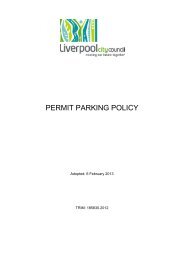to view the WARR Strategy. - Liverpool City Council - NSW ...
to view the WARR Strategy. - Liverpool City Council - NSW ...
to view the WARR Strategy. - Liverpool City Council - NSW ...
Create successful ePaper yourself
Turn your PDF publications into a flip-book with our unique Google optimized e-Paper software.
6.12 Problem Wastesa) Strategic ObjectiveWherever possible, <strong>to</strong> promote and participate in National, State and Local programs formanaging problem wastes. Where no programs exist, <strong>to</strong> seek stakeholder feedback onproblem wastes with a <strong>view</strong> <strong>to</strong> lobbying for viable disposal pathways for this material.b) Current PracticesProblem wastes are those waste with potential <strong>to</strong> damage human or environmental health ifnot properly disposed. <strong>Liverpool</strong> <strong>City</strong> <strong>Council</strong> currently provides services for <strong>the</strong> safecollection, recovery and disposal of <strong>the</strong> following three problem waste streams:Sharps and Clinical Wastes ProgramThis program involves collection of clinical and sharps wastes from six participatingpharmacies and 11 sharps collection bins at public facilities located within <strong>Liverpool</strong>. Theclinical waste collection from pharmacies receives contaminated syringes and o<strong>the</strong>r sharpssuch as insulin pens, needles, lancets, cannulas, scalpels or blades, dental wires, bloodcontaminateditems (such as blood glucose test strips), and dressings. The sharps collectionbins provide for safe disposal of contaminated syringes.In accordance with NHMRC (1999) and <strong>NSW</strong> Health (1998) guidelines, <strong>the</strong> provision of wastemanagement services for wastes from <strong>the</strong> health care industry, including sharps and clinicalwastes, should aim <strong>to</strong> enhance and protect public health and safety; <strong>to</strong> provide a saferworking environment; <strong>to</strong> minimise waste generation and <strong>the</strong> environmental impact of wastetreatment and disposal and <strong>to</strong> facilitate compliance with regula<strong>to</strong>ry requirements. TheAustralian and New Zealand Clinical Waste Management Industry Group (2004) has alsorecently issued a Code of Practice for <strong>the</strong> Management of Clinical and Related Wastes thatprovides advice and standards for all stakeholders involved in <strong>the</strong> generation, s<strong>to</strong>rage,transport, treatment and disposal of clinical and related waste.Household Hazardous Wastes<strong>Council</strong> currently participates in <strong>the</strong> DEC’s program for collection of household hazardouswastes. Through this initiative residents are provided with free drop off facilities for disposalof hazardous wastes and chemicals at temporary centres set up specifically for <strong>the</strong> programat regular intervals. <strong>Council</strong> participates in <strong>the</strong> program by providing locations forestablishment of temporary drop off centres within <strong>Liverpool</strong>, assisting with promotionalactivities, and developing traffic management plans for operation of <strong>the</strong> centres during dropoffdays.<strong>Council</strong>’s waste services guide and website also provides contact information on availablepermanent disposal facilities for selected household hazardous wastes (such as oils, paints,vehicle batteries and gas bottles) at WSN Environmental Solutions centres at Lucas Heights,Jacks Gully and Eastern Creek.<strong>Liverpool</strong> <strong>City</strong> <strong>Council</strong>83Waste Avoidance and Resource Recovery <strong>Strategy</strong>


